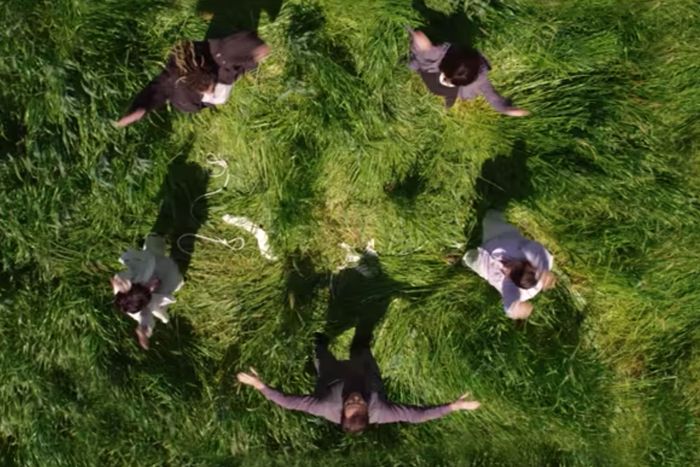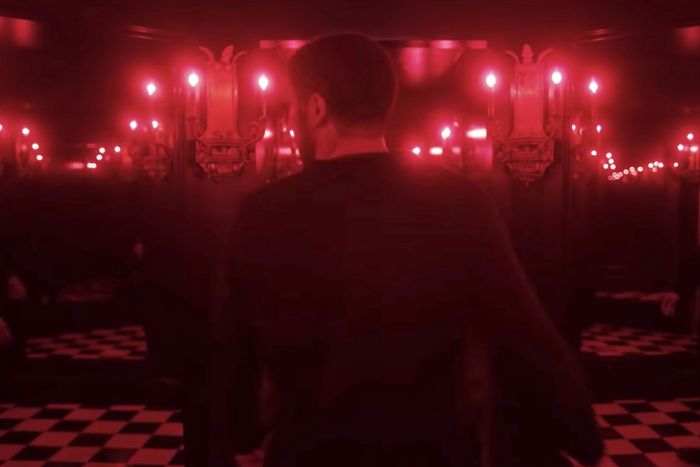
Spoilers for The OA: Part II below.
The OA’s second season asks a lot of us. Among other things, it asks us to remember that season one ended with a group of students using the power of interpretive dance to prevent a school shooting. It asks us to believe that said dancing propelled the OA (Brit Marling) into another dimension, one in which she is a Russian heiress who can read the thoughts of psychic octopuses. It asks us to buy into the notion that a San Francisco mansion is really a wormhole into countless additional dimensions, including one where trees talk to you. In other words, it is an absolutely perfect television show.
As someone who is Wikipedia-level familiar with string theory but failed freshman-year physics, as I watched the second season, I found myself wondering: How much of what happens on The OA is scientifically possible, at least in a speculative sense? Which of its “sci-fi-ish notions,” as Vulture’s own Jen Chaney put it, are the most plausible? Is it insane to wonder if I, too, might be a very rich and beautiful Russian person with 100 pairs of Agent Provocateur underwear in another dimension? If I tried hard enough, could I shoot the shit with trees? When I die, can I live on forever inside a mirror? To find answers to these important questions, I reached out to Professor Matthew Kleban, a quantum physicist who teaches at NYU and runs its Center for Cosmology and Particle Physics. Below is an edited version of our conversation, which I will bring to court when Professor Kleban attempts to have me committed to Treasure Island.
How familiar are you with The OA?
Not at all. After you reached out, I watched the first ten minutes, but didn’t have time to watch more. It wasn’t very clear what the connection was between [me and this show]. But it looked interesting, like it could go in one of a million different directions from there.
Oh, and it does! Can you tell me about your specific areas of expertise?
I work on theoretical cosmology, which means: What was the origin of the universe, the state of the universe, the large-scale structure of the universe now? And at the same time, I work on string theory, a quantum theory primarily intended to explain the substructure of elementary particles. So, we know that protons and neutrons are composed of quarks, and you have electrons and other elementary particles. String theory is the theory of what might lie below that structure, if you break apart quarks or electrons. It’s also a quantum theory of gravity.
Cool. So the premise of The OA is that there are multiple dimensions that exist all on top of each other. How realistic is this?
It depends what you mean by “all on top of each other.” But it’s quite possible that there might be extra dimensions, so long as they have a certain property. Let’s separate it into two possibilities: One is that there are extra dimensions that are what we call “compact,” which means — sort of like the surface of the Earth is compact — if you flew in an airplane in one direction long enough, you’d come back to where you started. If you had some extra dimensions — like, say, an extra dimension of space — which was compact, and the distance you’d need to travel to come back to where you started is sufficiently small — smaller than the smallest elementary particle we can study — we wouldn’t be able to tell there was an extra dimension.
The other possibility is that the extra dimensions are not compact, but for some reason or another, all of the matter we can interact with is stuck to its surface, three-dimensional in space, living inside this larger-dimensional space-time. These are two possibilities that we’ve considered very extensively in physics literature, going back more than a century. I hesitate to say it’s likely or unlikely, but it’s a possibility. If string theory is true, there are extra dimensions. It’s not a crazy idea.
Within the extra dimensions on The OA, there’s a different version of every person. So our protagonist, the OA, exists in one dimension as herself, and in another dimension as another version of herself with slight variations. Everyone else she knows is also in that second dimension. Does that seem possible to you?
That doesn’t fit … anything. [Laughs.] A dimension is a direction. We live in three dimensions, and if we want to specify the location of something in space, we have to give three numbers. To say there are two copies, what does that mean? There’s me here, and there’s another me on the next floor up?
Yes. In a different dimension, you are living a different version of your own life.
That’s just not the way the term is used. It doesn’t mean there’s a parallel world. You’ve probably seen Stranger Things with the Upside Down — that’s not another dimension. To the extent you can make sense of it, it’s some other place. Maybe you can get to it by moving through another dimension? But it’s just another three-dimensional space.
When you say “dimension,” I think you mean it differently than the show does. The OA refers to “dimensions” as sort of parallel worlds. There’s no physics theory wherein a parallel world exists?
No, there are. They don’t involve other dimensions, necessarily. The other worlds are never other dimensions themselves. I can give you a whole list of these theories.
Please do!
One of them is that we just live in a really big universe, and different parts of it are very different, so if we were able to travel very far in one of our three dimensions — maybe faster than light, which is impossible, but just imagine — that you might end up in some other location that has very different laws of physics. That’s called the multiverse.
Another way in which that idea rises is in quantum mechanics. According to the equations that govern the evolution of the mathematics of the description that we have for quantum systems, we know for certain that these mathematics apply to elementary particles that we can study in the lab. But the description is probabilistic: It doesn’t tell you for certain that something is here or there. It may tell you that something is here and there. It’s in a state where it’s in both places at the same time. We don’t have good English words for this, but it’s called a quantum superposition.
Anyway, you can think of that as two worlds. One where the particle is in one place, the other where it’s in a different place. But the number of dimensions is still three.
I think the show is dealing in multiverses, but referring to them as “dimensions.” They’re coming from more of a Schrödinger’s cat perspective. What would you call it instead of “dimension”?
Yeah, people use these terms differently. I guess I’d call it a quantum superposition.
When the OA discovers a way to jump into other dimensions, or superpositions, she calls it “jumping into the invisible river.” Do you think there’s a way for us to jump into other realities?
[Long pause.] No.
Okay. The way that they do this is by performing a series of very dramatic dance moves with a group of five people. If you do it long enough and “with perfect feeling,” you are transported. Possible?
[Long pause.] No. No.
When that happens, your original body dies. So you’re dead in one superposition and alive in another, but inside the head of your new self.
So their consciousness is transported from one to the other? And if they didn’t do that, there’d be two independent versions of them?
Yeah.
Um, okay. There’s nothing remotely like this in any branch of physics. I should say that consciousness is regarded as a mystery. Personally I don’t understand why, but it is. And some people think quantum mechanics has something to do with it. I’m skeptical of this, but maybe. Even if that were the case and consciousness relied on quantum mechanics … yeah, no.
Let me say this: There is something very exotic about quantum mechanics and superpositions. If the same mathematics that describe particles and small systems, how they can be in superpositions and states that are contradictory — let’s say the particle is both here in New York and in Boston — also describes human beings, and I think it does most likely, then it is possible for human beings to be in the same kind of superpositions. You could think of it as two of very, very many alternate worlds. This is called the many-worlds interpretation.
It’s a crazy and exotic idea, almost like saying that when you flip a coin, instead of there being a definite outcome, there are both outcomes, and then the world splits into these two worlds. And every time a random event happens, this split happens, so there’s an infinite number of worlds. In some sense, that may be the correct description of reality. But in quantum mechanics, these worlds rapidly lose all contact with each other. If you find yourself in one, you’ll never interact with the other one. Jumping back and forth is definitely not allowed.
But you do believe that it’s likely that human beings have different superpositions?
I think it’s likely, yeah. Although it may sound weird, I think it’s the simplest explanation for what we observe in the world. It’s really just extending the mathematics of quantum mechanics that we apply to small systems to large systems as well.
Where are these other versions of ourselves?
They don’t exist in space. The closest analog is a probability space, in the sense that it’s like flipping a coin.
They just exist in our minds?
That’s a hard question because I don’t know what “exist” means here. If this is the world, this is what existing is. But not the way we think of it. It’s so different from how we’re used to thinking about the world, so it’s very hard to describe. What it really comes down to is mathematics. We trust those more than we trust our ideas about the way things are or ought to be.
So it’s not like you and I are talking right now in another superposition and then one of us gets hit by a bus?
It is kind of like that. Just not in another universe. Right here. It’s not separate in any sense in space. What separates them is some sort of branching, the wave function, which describes our state.
I feel like I almost get it, but I am going to move forward. The movements I described earlier can also heal people and bring them back from the dead. Thoughts?
No. Nothing even close in science. That’s totally insane.
The second version of our protagonist, in this new multiverse, can communicate with trees and animals. She is a medium to nature.
Communicate with trees? Like, what would that mean?
She can understand them.
Meaning they have brains and intelligence? That seems extraordinarily unlikely, from everything we know about trees. Aside from being able to communicate with them.
The trees all communicate with each other, too. They form a sort of tree internet. They heal each other and they chat. And they’re psychic.
There is no reason to believe that trees do anything other than grow.
That’s disappointing to me personally, but okay. So, at another point in the show, an octopus is also revealed to be psychic.
[Laughs.] This is getting better and better. Did it predict the World Cup?
Octopuses are very smart, right?
Yes, they are.
So maybe they’re psychic?
I’m not sure how one statement follows from the other, but okay.
There’s also a house wherein people can get stuck till the end of time; they have to solve it like a puzzle, and it’s a portal to other dimensions.
If you want to talk about portals to other worlds — not those we were just talking about, like the different branches of the wave function or different superpositions — you could, in principle, have more than three spatial dimensions, but we’re stuck to a three-dimensional surface. In that scenario, it’s possible that there could be a wormhole. There are some sort of mathematical solutions that might correspond to reality where there’s a connection between two distant points. It’s very unlikely, though, because if it does exist, it probably violates causality.
For example, think of a Back to the Future–type scenario, where you go back and kill your grandmother. You don’t exist, so how did you prevent your grandparents’ lives? This presents a logical paradox. If you could build wormholes that almost always leads to that sort of paradox, which means you probably cannot build these things. With that said, there is some scientific literature on the notion of wormholes, so I suppose if such a thing could exist, one end of it could be inside a house.
Great! In the universe of the show, you can hear other dimensions whispering if you listen closely.
Well, no.
And spirits — or someone’s consciousness — can communicate via television sets and mirrors.
This is way beyond … anything. One thing you can say about science, though, is that it’s never finished. It’s always provisional. If it was certain to be true, it wouldn’t be science by definition. It’s a set of ideas that could be disproved. So it’s always, “Maybe.” No honest scientist can ever say, “Absolutely not.” But there are also state-of-the-art, “What do we think is most likely?” theories. And this is … not the way we think the world is.
People once thought the world was flat!
Not that many people, actually. Only people who didn’t think about it. Even if you go back 2,500 years to when the Phoenicians were sailing around, they knew the world was round because they saw ships disappear over the horizon, and they knew how far away the horizon was. Aristarchus even estimated the size of the Earth accurately. It just takes geometry to figure it out. People knew.
Anyway, I take your point. For sure people believed things that were wrong. I have no doubt we have many things we believe now that are totally wrong. Future generations will look back and think, How could they believe that?
Do you think in another superposition, you and I are having this conversation, but with more knowledge, and we’re laughing at ourselves in this superposition?
[Laughs.] I don’t think they’d be laughing at us because I don’t think they’d have any awareness of our existence. Even if they did, and the idea of all of the branches is right, there’d be millions of [superpositions]. Why laugh at this particular one and not all of them? Also, it’s you with a different set of knowledge. I don’t know about you, but I wouldn’t laugh at myself for being an idiot because I didn’t know something.





